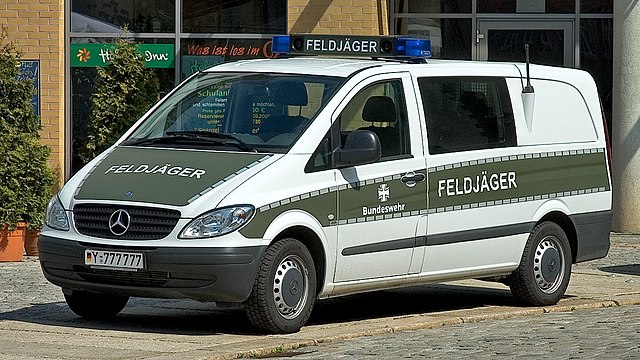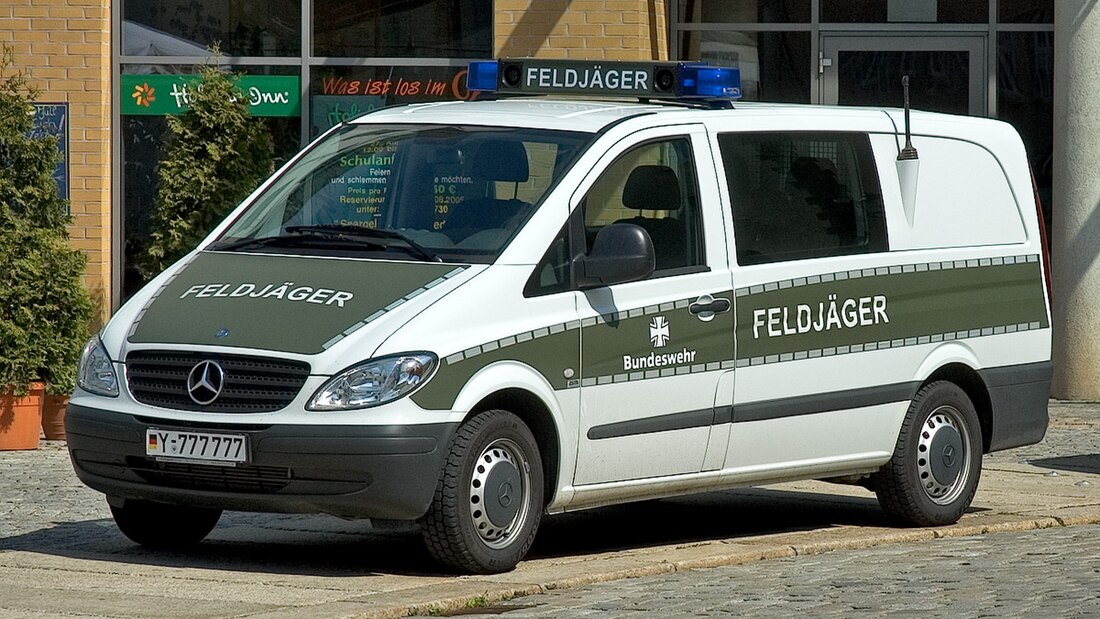Joint Support Service (Germany)
Logistics branch of the Bundeswehr From Wikipedia, the free encyclopedia
The Joint Support and Enabling Service (German: Streitkräftebasis, pronounced [ˈʃtʁaɪ̯tˌkʁɛftəˌbaːzɪs] ⓘ, abbreviated: SKB, pronounced [ɛskaːˈbeː] ⓘ; literally Armed Forces Foundation) is a branch of the German Bundeswehr established in October 2000 as a result of major reforms of the Bundeswehr. It handles various logistic and organisational tasks of the Bundeswehr. The SKB is one of six components of the Bundeswehr, the other five being the Army, Navy, Air Force, the Joint Medical Service, and the Cyber and Information Domain Service. As of April 2020, the force is composed of 27,840 personnel.[1] In May 2021 the minister of defense Annegret Kramp-Karrenbauer together with inspector general Eberhard Zorn published a plan to dissolve the Joint Support and Enabling Service and to reintegrate its units into the army, navy, airforce and cyber command.[3]
| Joint Support and Enabling Service | |
|---|---|
| Streitkräftebasis | |
 Logo of the Joint Support and Enabling Service | |
| Active | 1 October 2000 |
| Country | Germany |
| Allegiance | Bundeswehr |
| Branch | Multi-service |
| Type | Joint |
| Role | Military logistics |
| Size | 28,000 (2023)[1] |
| Part of | Kommando Streitkräftebasis |
| Garrison/HQ | Hardthöhe |
| March | Marsch der Streikräftebasis[2] |
| Website | www |
| Commanders | |
| Inspector | Generalleutnant Martin Schelleis (German Air Force) |
| Deputy Inspector | Generalleutnant Peter Bohrer (German Air Force) |
| Chief of Staff | Generalmajor Jürgen Setzer (German Army) |
| Notable commanders | Manfred Nielson, Wolfram Kühn |

Structure
Summarize
Perspective
Unlike the similar British Defence Logistics Organisation and the Australian Department of Defence's Support Command Australia, a number of combat-associated commands were allotted to the SKB, principally the small German territorial defence structure embodied in the four Wehrbereichskommandos (Military District Commands), and the national supervision of active German military operations beyond the NATO area,[clarification needed] performed by the Armed Forces Operations Command (the Einsatzführungskommando der Bundeswehr), which is headquartered in Potsdam.
The WBK headquarters were in Kiel (WBK I); Mainz (WBK II); Erfurt (WBK III); and Munich (WBK IV). Each Military District Command controlled several Landeskommandos (State Commands) due to the federal structure of Germany. Previously this function was carried out by the Verteidigungsbezirkskommandos (VBKs) or Military Region Commands (Defence District Commands). These commands were in charge of all military facilities in their area of responsibility and of several supporting regiments. The SKB headquarters was formed on the basis of the former IV (German) Corps[clarification needed] headquarters. Most of its remaining elements have been reassigned from the Central Military Agencies of the Bundeswehr, encompassing a wide range of logistics agencies, schools, and other support units.
The top command authorities are the Kommando Streitkräftebasis (Joint Support and Enabling Service Command) which is in charge of numerous of command and control roles. The Streitkräfteamt (Armed Forces Office) directs all schools, training and research centres, the Militärischer Abschirmdienst (Military Counterintelligence Service), and the Bundeswehr's higher academies and universities.
In April 2012 as part of the major reorganisation that ended conscription, the Armed Forces Operations Command (Einsatzführungskommando) was resubordinated directly to the Inspector of the Bundeswehr.[4]
In September 2022 another reorganisation created the Territorial Operations Command (Territoriales Führungskommando) from parts of the JJoint Support and Enabling Service, which also was subordinated directly to the Inspector of the Bundeswehr.[5]
- Joint Support and Enabling Service Headquarters, in Bonn[6]
- Military Studies Office, in Munich
- Federal Security Policy Academy, in Berlin
- German Military Representative at NATO & EU, in Brussels
Logistic Command
 Bundeswehr Logistic Command, in Erfurt[7]
Bundeswehr Logistic Command, in Erfurt[7]
 1st Logistic Regiment, in Burg bei Magdeburg
1st Logistic Regiment, in Burg bei Magdeburg
 161st Logistic Battalion, in Delmenhorst
161st Logistic Battalion, in Delmenhorst 163rd Logistic Battalion, in Delmenhorst
163rd Logistic Battalion, in Delmenhorst 171st Logistic Battalion, in Burg bei Magdeburg
171st Logistic Battalion, in Burg bei Magdeburg 172nd Logistic Battalion, in Beelitz
172nd Logistic Battalion, in Beelitz
 4th Logistic Regiment, in Volkach (activated 12 October 2023)
4th Logistic Regiment, in Volkach (activated 12 October 2023)
 461st Logistic Battalion, in Walldürn
461st Logistic Battalion, in Walldürn 467th Logistic Battalion, in Volkach
467th Logistic Battalion, in Volkach- 471st Logistic Battalion, in Osterheide (will go active 1 October 2024)
 472nd Logistic Battalion, in Kümmersbruck
472nd Logistic Battalion, in Kümmersbruck
 164th Special Pioneer Regiment, in Husum
164th Special Pioneer Regiment, in Husum Bundeswehr Logistic School, in Osterholz-Scharmbeck
Bundeswehr Logistic School, in Osterholz-Scharmbeck Bundeswehr Logistic Center, in Wilhelmshaven
Bundeswehr Logistic Center, in Wilhelmshaven Bundeswehr Motor Vehicles Center, in Mönchengladbach
Bundeswehr Motor Vehicles Center, in Mönchengladbach
Military Police Command
 Bundeswehr Military Police Command, in Hanover
Bundeswehr Military Police Command, in Hanover
CBRN-defense Command
 Bundeswehr CBRN-defense Command, in Bruchsal
Bundeswehr CBRN-defense Command, in Bruchsal
 CBRN-defense and Legal Protection Tasks School, in Sonthofen
CBRN-defense and Legal Protection Tasks School, in Sonthofen 1st CBRN-defense Regiment, in Strausberg
1st CBRN-defense Regiment, in Strausberg 7th CBRN-defense Battalion, in Höxter
7th CBRN-defense Battalion, in Höxter 750th CBRN-defense Battalion "Baden", in Bruchsal
750th CBRN-defense Battalion "Baden", in Bruchsal
Armed Forces Office
- Armed Forces Office, in Bonn
- Bundeswehr Verification Tasks Centre, in Geilenkirchen
- Bundeswehr Service Dog School, in Ulmen
- Bundeswehr Public Relations Centre, in Strausberg
- Bundeswehr Military Music Centre, in Bonn
- Bundeswehr Sport School, in Warendorf
References
External links
Wikiwand - on
Seamless Wikipedia browsing. On steroids.
